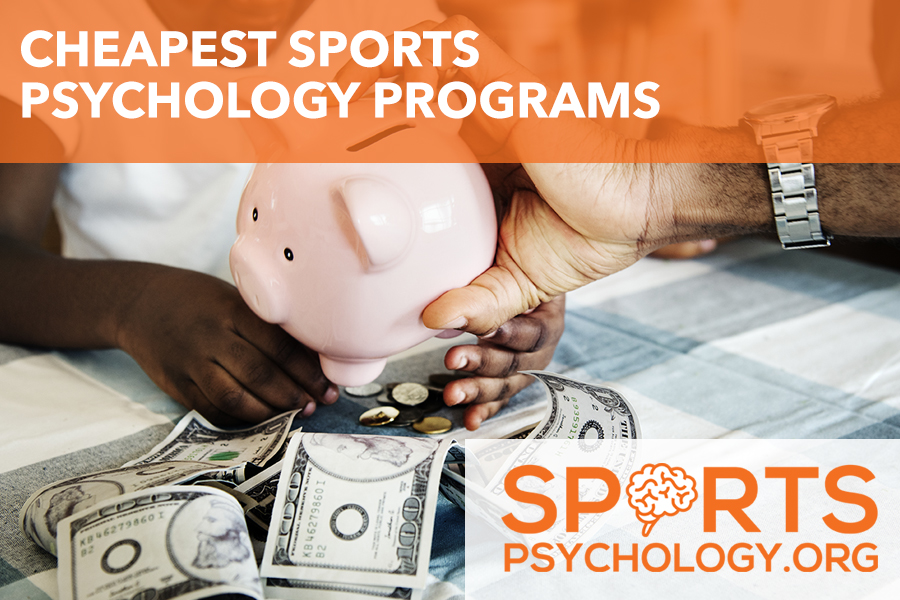Cheapest Sports Psychology Programs in 2025
Thinking about diving into the world of sports psychology but worried about the price tag? You’re not alone. Pursuing a degree in this dynamic and rewarding field can be a game-changer, but the costs can vary wildly from one program to the next. Whether you're an aspiring performance coach, mental health consultant, or just passionate about helping athletes reach their peak, finding the cheapest sports psychology programs without sacrificing quality is the smart move. In this guide, we’re breaking down some of the most affordable options out there—so you can focus on your future, not your finances.

We’ll take a deep look into what drives program tuition, clever ways to cut down on costs, and where to find the most budget-friendly options in the U.S. and online. And if you’re the type who likes to plan ahead, we've even thrown in tips on how to maximize your education dollar without compromising your career goals.
So, let's get into it—because the path to a fulfilling, affordable education in sports psychology starts right here.
2026 Most Affordable Sports Psychology Programs
West Virginia University
Morgantown, WV - Public 4-Year - wvu.edu
Bachelor's - Sport, Exercise, and Performance Psychology BS
Campus Based - Visit Website
West Virginia University's Bachelor's in Sport, Exercise, and Performance Psychology presents an affordable undergraduate pathway into sports psychology. As the only program of its kind in West Virginia, students can complete the degree with 120 credit hours at a competitive tuition rate. The program's 2.0 GPA admission requirement makes it accessible to a broader range of students. With an accelerated bachelor's to master's option, students can efficiently advance their education while minimizing overall educational costs. The curriculum's interdisciplinary approach and career exploration courses provide comprehensive training without excessive financial burden, making it an economically smart choice for aspiring sports psychology professionals.
- Unique undergraduate sports psychology program
- Accelerated bachelor's to master's option
- 120 total credit hours
- Admission requires 2.0 GPA
- Capstone experiential learning required
- Prepares for multiple career paths
- Only program in West Virginia
- Covers sport, exercise, performance domains
- Career exploration courses included
- Interdisciplinary curriculum approach
Master's - Sport, Exercise and Performance Psychology, M.S.
Campus Based - Visit Website
West Virginia University's affordable Master's in Sport, Exercise, and Performance Psychology offers exceptional value through its compact 36-credit curriculum. With tuition rates lower than comparable programs and multiple graduate assistantship opportunities, students can minimize educational expenses while receiving high-quality training. The program's integrated approach combines counseling techniques, research methodology, and performance psychology, preparing professionals for diverse career paths. Students benefit from specialized coursework covering psychological performance enhancement, student-athlete counseling, and evidence-informed strategies. The military-friendly designation and potential tuition waivers further contribute to the program's affordability and accessibility for aspiring sports psychology professionals.
- 36 total credit hours
- Integrated with Ph.D. program
- Thesis research required
- Counseling and performance focus
- Multiple specialized course options
- Advanced disciplinary knowledge
- Ethical and legal issues covered
- Professional practice oriented
Doctorate - Sport, Exercise and Performance Psychology PhD
Campus Based - Visit Website
West Virginia University's PhD in Sport, Exercise and Performance Psychology offers remarkable affordability through generous graduate assistantships, tuition waivers, and stipend opportunities. The 3-4 year full-time program provides exceptional value with a 100% graduate employment rate and comprehensive training across research, clinical, and consulting domains. GRE scores are required, but the program's competitive funding options offset potential financial barriers. Students receive extensive mentorship, research experiences, and professional certification preparation. The concurrent Clinical Mental Health Counseling option adds significant value, enabling graduates to pursue diverse career pathways while maintaining an economically strategic approach to advanced sports psychology education.
- Full-time 3-4 year doctoral program
- Concurrent clinical counseling option
- 100% graduate employment rate
- Research and applied experiences
- Division I-III athletic consulting
- Application deadline: December 1
- GRE scores required
- Minimum 2.75 GPA
- Fall semester entry only
- Graduate assistantships available
Doctorate - Sport, Exercise and Performance Psychology PhD
Concentration: Clinical Mental Health Counseling - Campus Based - Visit Website
West Virginia University's specialized PhD in Sport, Exercise and Performance Psychology with a Clinical Mental Health Counseling concentration represents an affordable pathway for advanced professional development. The 65-75 credit hour program offers significant financial advantages through graduate assistantships and potential tuition waivers. With a licensure-eligible curriculum and 100% graduate employment rate, students receive exceptional educational value. The in-person residency in Morgantown provides comprehensive training across research, clinical practice, and athletic consulting domains. Competitive application requirements and December 1st deadline ensure access to a high-quality, cost-effective doctoral program in sports psychology.
- PhD with concurrent counseling master's
- 3-4 year full-time program
- In-person residency in Morgantown
- 65-75 credit hour curriculum
- Research-focused dissertation
- Division I-III athletic consulting
- Application deadline: December 1
- Graduate assistantships available
- Licensure-eligible program
- 100% graduate employment rate
California Baptist University
Riverside, CA - Private 4-year - calbaptist.edu
Bachelor's - Sport and Performance Psychology, BS
Online Learning - Visit Website
California Baptist University's online Bachelor of Science in Sport and Performance Psychology presents an economical pathway into sports psychology, featuring a competitive $520 per unit cost and accelerated 16-month completion timeline. The program strategically balances affordability with comprehensive training, offering 49 total program units covering cognitive psychology, exercise physiology, and ethical practices. With transfer-friendly policies, frequent start dates every 8 weeks, and WSCUC accreditation, students can efficiently prepare for careers in athletic coaching, mental health, and performance consulting. The faith-integrated curriculum adds unique value to the educational experience.
- 100% Online Degree
- 49 Total Program Units
- 16 Months to Complete
- $520 Per Unit Cost
- Classes Start Every 8 Weeks
- Three Semesters Annually
- Transfer-Friendly Program
- WSCUC Accredited Degree
- Multiple Career Pathways
- Faith-Integrated Curriculum
Master's - Master of Science in Sport and Performance Psychology
Campus Based - Visit Website
California Baptist University's Master's in Sport and Performance Psychology offers an affordable graduate program leveraging its faith-based institutional structure and online flexibility. With only 43 total program units and competitive per-unit pricing, students can efficiently prepare for Association of Applied Sport Psychology certification. The comprehensive curriculum covers performance enhancement across multiple domains including sports, performing arts, and surgical skills. Prerequisites include psychology and statistics backgrounds, making it accessible for professionals seeking specialized mental performance training. The program's military-friendly status and transfer-friendly policies further enhance its affordability and accessibility for diverse student populations.
- Master of Science degree
- 43 total program units
- Certification preparation
- Broad performance domains
- Multiple practicum experiences
- Prerequisites include Psychology
- Anatomy/Physiology recommended
- Statistics course required
- Professional ethics focus
- Advanced research methodology
Kent State University
Kent, OH - Public 4-Year - kent.edu
Bachelor's - Sport, Exercise and Performance Psychology
Online Learning - Visit Website
Kent State University offers an accessible and comprehensive online Bachelor of Science in Sport, Exercise and Performance Psychology, strategically designed for students seeking flexible psychological training. The program's affordability stems from competitive in-state tuition rates around $52,200 and a 100% online delivery model that reduces additional expenses like housing and transportation. Students explore critical psychological dynamics including athlete motivation, mental training techniques, and performance enhancement strategies. The curriculum balances theoretical knowledge with practical skills development, preparing graduates for diverse careers in sports performance, coaching, and mental health support. With 120 total credit hours completed in four years, the program provides multiple career pathway options and emphasizes ethical practice principles and research-driven intervention training.
- 100% online degree program
- 120 total credit hours
- Graduate in 4 years
- Focuses on performance psychology
- Tuition ~$52,200 for Ohio residents
- Multiple career pathway options
- Psychological performance focus
- Practical skills development
- Ethical practice principles
- Research and intervention training
University of West Alabama
Livingston, AL - Public 4-Year - uwa.edu
Master's - Master of Science in Experimental Psychology
Concentration: Sports Psychology - Online Learning - Visit Website
The University of West Alabama's Master of Science in Experimental Psychology with a Sports Psychology concentration stands out as an affordable online program for aspiring sports psychology professionals. At just $429 per credit hour, students can access a comprehensive curriculum that prepares them for advanced clinical applications and potential doctoral studies. The program uniquely offers a flexible pathway with thesis or comprehensive exam options, ensuring students develop robust research skills and practical training in sports psychology. With a focus on data analysis, psychological assessment, and professional ethics, students benefit from a structured 39-54 credit hour program that includes a practicum experience. A minimum 3.0 GPA and GRE scores are required for admission, making it an accessible yet rigorous educational pathway for those passionate about understanding athletic performance and mental health.
- Online Sports Psychology Option
- 39-54 total credit hours
- Next start date March 17
- $429 per credit hour
- Practicum included
- Thesis or exam option
- Prepare for doctoral studies
- Advanced sports psychology course
- Minimum 3.0 GPA required
- GRE score needed
Southern Illinois University-Edwardsville
Edwardsville, IL - Public 4-Year - siue.edu
Master's - MS in Kinesiology
Concentration: Exercise and Sport Psychology - Online & Campus Based - Visit Website
Southern Illinois University-Edwardsville's Exercise and Sport Psychology MS program presents an affordable educational pathway leveraging online flexibility and career-focused curriculum. The hybrid program minimizes traditional campus expenses while delivering comprehensive psychological training for athletic performance enhancement. With potential GRE waiver options and asynchronous evening courses, students can maintain professional employment during studies. The 12-22 month program strategically prepares candidates for CMPC certification and diverse career opportunities in sports psychology, fitness industries, and behavioral medicine. Affordability stems from reduced travel costs, flexible scheduling, and potential employer tuition reimbursement opportunities. Mentorship from experienced faculty and personalized career advising further enhance the program's value proposition for aspiring sports psychology professionals.
- 100% Online Program
- 12-22 Months Completion
- Evening/Asynchronous Courses
- CMPC Certification Preparation
- Career-Focused Curriculum
- Mentorship from Faculty
- Multiple Career Pathways
- Research Opportunities
- Professional Development Focus
- Personalized Career Advising
Georgia Southern University
Statesboro, GA - Public 4-Year - georgiasouthern.edu
Master's - Master of Science in Kinesiology
Concentration: Sport and Exercise Psychology - Campus Based - Visit Website
Georgia Southern University's Sport and Exercise Psychology concentration within the Master of Science in Kinesiology offers an exceptional value for aspiring sports psychologists. The affordable 36-credit program strategically prepares students through two distinct tracks: thesis and internship. With a competitive 3.0 GPA requirement and graduate assistantships available, students can minimize educational expenses while receiving comprehensive training. The program uniquely aligns with Association for Applied Sport Psychology certification standards, providing robust professional development opportunities. Located on the in-person Statesboro Campus with a fall entry term, students benefit from practical experiences and research opportunities designed to enhance mental skills training and performance enhancement techniques. Potential students should note the February 1st application deadline and requirement of three recommendation letters.
- 36 credit hours
- In-person Statesboro Campus
- Fall entry term
- Thesis and internship tracks
- GPA requirement: 3.0
- Application deadline: Feb 1
- Three recommendation letters
- Personal statement required
- Graduate assistantships available
- Aligned with AASP certification
University of North Carolina at Greensboro
Greensboro, NC - Public 4-Year - uncg.edu
Master's - Kinesiology, M.S. Applied Sport Psychology Concentration
Concentration: Applied Sport Psychology - Campus Based - Visit Website
UNC Greensboro's Master's in Kinesiology with Applied Sport Psychology concentration delivers a comprehensive program targeting aspiring sport psychology professionals. With a rigorous 400-hour mentored experience requirement, students gain practical clinical training designed to prepare for Certified Mental Performance Consultant certification. The program's affordability stems from its in-state tuition rates and focused curriculum that minimizes unnecessary coursework. The program's unique selling point is its interdisciplinary approach, blending performance techniques, sport science, and counseling skills to help athletes optimize mental performance and enjoyment. With a diverse 20-student cohort model, students receive personalized attention and networking opportunities in a collaborative learning environment.
- Unique CMPC certification curriculum
- 400 hours mentored experience required
- Only NC sports psychology program
- 20-student diverse cohort model
- In-person class format
- Interdisciplinary faculty collaboration
- Career paths: coaching, consulting, doctoral study
Master's - Kinesiology, M.S. Sport and Exercise Psychology Concentration
Concentration: Sport and Exercise Psychology - Campus Based - Visit Website
UNC Greensboro's Master's in Sport and Exercise Psychology offers a flexible, comprehensive program with three specialized tracks catering to diverse career goals. The 36-credit hour curriculum provides in-depth exploration of psychological performance factors, preparing students for certification as Mental Performance Consultants. Its affordability is highlighted by competitive tuition rates and multiple delivery formats. Students benefit from interdisciplinary faculty collaborations, research laboratory opportunities, and practical experiences across sports and exercise domains. Suitable for students with Kinesiology or Psychology backgrounds, the program balances theoretical knowledge with hands-on training, positioning graduates for impactful roles in coaching, consulting, teaching, and research.
- Three program track options
- 36 credit hours for thesis/applied tracks
- 30 credit hours for online coursework
- In-person and online delivery
- Certified Mental Performance Consultant preparation
- Research laboratory opportunities
- Interdisciplinary faculty collaborations
- Practicum and research experiences
- Suitable for Kinesiology/Psychology backgrounds
Master's - Kinesiology, M.S. Sport and Exercise Psychology Concentration
Concentration: Sport and Exercise Psychology (coursework-only, online) - Online Learning - Visit Website
UNC Greensboro's online Master's in Sport and Exercise Psychology provides a flexible, cost-effective solution for professionals seeking advanced psychological training. The two-year, 30-credit-hour program features asynchronous coursework, allowing students to balance academic pursuits with professional commitments. Affordability is a key advantage, with lower overhead costs compared to traditional on-campus programs. Designed for Kinesiology and Psychology graduates, the curriculum integrates cutting-edge theory and research, preparing students for diverse careers in mental skills consulting, athletic training, and health promotion. Expert faculty mentorship and a comprehensive online learning experience ensure students receive high-quality education without geographical constraints.
- Fully online program
- 30 credit hours total
- Two years to complete
- Six credits per semester
- Asynchronous online courses
- Flexible learning experience
- Expert faculty mentorship
- Prepares for diverse careers
- Integrates theory and research
- School of Health Sciences
Doctorate - Kinesiology, Ph.D. Sport and Exercise Psychology Concentration
Concentration: Sport and Exercise Psychology - Campus Based - Visit Website
UNC Greensboro's PhD in Kinesiology with Sport and Exercise Psychology concentration provides a research-intensive pathway for academic professionals. As a nationally ranked R2 research university, the program offers exceptional research laboratory facilities and interdisciplinary research opportunities. The program's affordability is enhanced by potential research funding and faculty mentorship. Doctoral candidates explore complex psychological dimensions of sport and exercise behaviors, developing advanced research methodologies. Graduates are strategically positioned for academic careers, with comprehensive training in human performance psychology. The program's GRE requirements and competitive admission process ensure a high-quality, focused academic experience for dedicated researchers.
- R2 University Research Productivity
- In-Person Doctoral Degree
- Research Laboratory Facilities
- Faculty Research Funding
- Interdisciplinary Research Opportunities
- Close Faculty Mentorship
- Sport and Exercise Psychology Concentration
- Academic Career Preparation
Northwest Missouri State University
Maryville, MO - Public 4-Year - nwmissouri.edu
Master's - Sport and Exercise Psychology M.S.
Campus Based - Visit Website
Northwest Missouri State University offers an affordable Master's in Sport and Exercise Psychology that provides exceptional value for aspiring sports psychology professionals. With a comprehensive 45-credit graduate program, students benefit from low in-state tuition rates and a curriculum that prepares them for advanced performance optimization roles. The program's strategic design includes GRE requirement, AASP certification preparation, and a mandatory research project, making it cost-effective for students seeking targeted professional development. The March 1 application deadline and minimum 3.00 GPA requirement ensure a competitive yet accessible academic pathway for dedicated sports psychology candidates.
- 45 total graduate credit hours
- Fall entry only
- March 1 application deadline
- 3.00 minimum undergraduate GPA
- Research project required
- AASP certification preparation
- Comprehensive exam mandatory
- Continuous enrollment required
- Professional goal statement needed
- GRE scores required
California State University-Fresno
Fresno, CA - Public 4-Year - fresnostate.edu
Master's - Master of Science in Sport and Performance Psychology
Campus Based - Visit Website
California State University-Fresno offers an affordable Master of Science in Sport and Performance Psychology that stands out for its cost-effective, comprehensive training. The 30-unit program provides exceptional value through its robust curriculum aligned with Association for Applied Sport Psychology standards. Students benefit from economical tuition rates typical of public state universities, combined with extensive practical training opportunities. The program's affordability is enhanced by potential graduate teaching positions and a sport psychology lab that minimizes additional research expenses. With flexible thesis and project options, students can customize their educational path without incurring substantial extra costs. The curriculum prepares graduates for the Certified Mental Performance Consultant designation, making it a financially strategic choice for aspiring sport psychology professionals.
- 30-unit Master's degree
- AASP core competency aligned
- Thesis or project option
- Sport Psychology Lab
- CMPC certification preparation
- Research methods focus
- Internship opportunities available
- Graduate Teaching positions
- Advanced sport psychology courses
- Counseling techniques elective
Troy University
Troy, AL - Public 4-Year - troy.edu
Master's - Master of Science in Kinesiology
Concentration: Sports Psychology - Online & Campus Based - Visit Website
Troy University's Master of Science in Kinesiology with a Sports Psychology concentration provides an affordable pathway for students seeking specialized training in athletic mental performance. The hybrid program offers flexibility for working professionals, with online course options reducing overall educational expenses. Military-friendly status potentially offers additional cost-saving opportunities for veterans and active service members. The program's interdepartmental collaboration between Kinesiology and Psychology departments ensures comprehensive training without the high overhead of more expensive private institutions. Students can expect to develop advanced skills in athlete mental health, performance optimization, and psychological intervention strategies, making it a cost-effective investment for aspiring sports psychology professionals. Potential GRE requirements should be confirmed directly with the university admissions office.
- Graduate-level Sports Psychology program
- Interdepartmental collaboration
- Research and practical experiences
- Growing career field
- Online program availability
- Partnership between Kinesiology and Psychology departments
- Courses in sports nutrition, performance
- Supports diverse sports settings
Other Ways to Save Money on Your Sports Psychology Degree
If you're set on entering the world of sports psychology but your budget is tight, there are some strategic moves you can make to slash the overall cost. Let's break down the most effective ways to save money without sacrificing the quality of your education.
1. Apply for Scholarships and Grants
Many organizations offer scholarships specifically for psychology students or those pursuing degrees in sports science. These can range from a few hundred to several thousand dollars per year. Check with professional associations like the Association for Applied Sport Psychology (AASP) or local psychology boards.
RELATED: Find a Sports Psychology school near you.
2. Look Into In-State Tuition Waivers
Some states and universities offer waivers or reduced rates for out-of-state students under regional agreements. Programs like the Western Undergraduate Exchange (WUE) or Academic Common Market could save you thousands if your desired school is in a partner state.
3. Choose Online or Hybrid Programs
These programs often allow you to avoid housing costs, commuting expenses, and sometimes even offer cheaper tuition. Just make sure the program is fully accredited and offers the hands-on components or internships required by the field.
4. Start at Community College or Transfer Credit
If you're entering a bachelor's program, starting with general education classes at a local community college can save a bundle. Just make sure those credits transfer to your chosen four-year institution.
5. Take Advantage of Tuition Reimbursement
Already working? See if your employer offers tuition reimbursement. This is especially common in health and wellness fields, and many companies are happy to invest in employee development—particularly if the training benefits them too.
6. Max Out Federal Aid and Work-Study
Filing the FAFSA can unlock federal grants, low-interest loans, and even work-study opportunities. These can lighten your load financially and help you avoid high-interest private loans.
Being smart about these options can easily reduce your education costs by thousands—and make your dream of a career in sports psychology much more accessible.


- Cheapest Sports Psychology Programs in 2025 - April 16, 2025
- From Athlete to Sports Psychologist: How Former Competitors Can Build a Career in Performance Psychology - April 2, 2025
- How to Land an Internship in Sports Psychology - February 26, 2025

